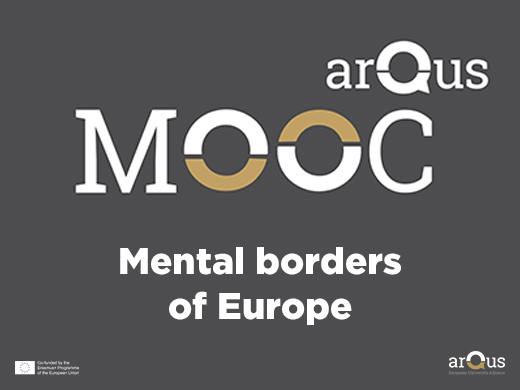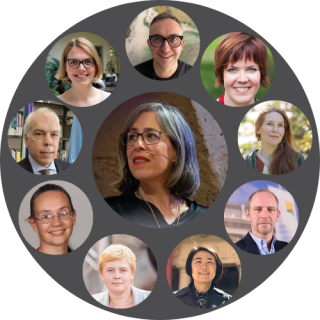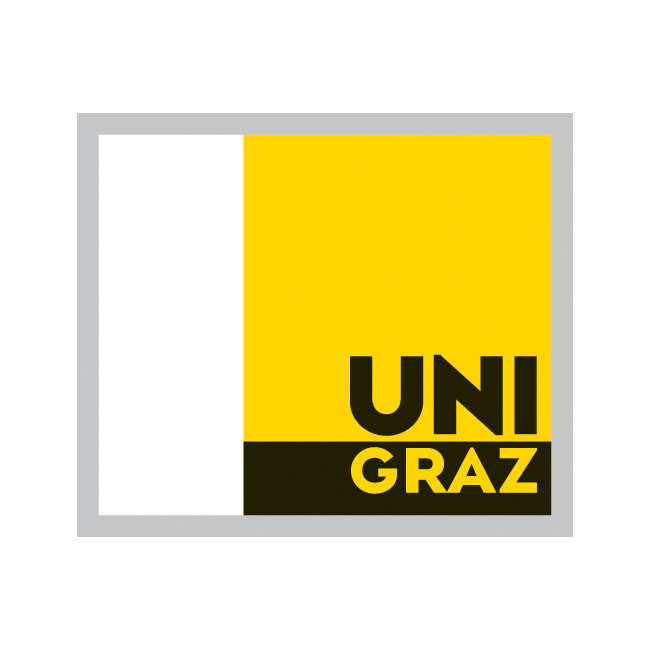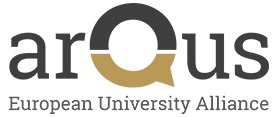


Mental borders, physical borders and the shaping of modern European identity and citizenship
University of Graz
Elena Arigita
Qui som
Informació general del curs
#ArqusMOOC #MentalBordersofEurope #HumanitarianBorders #EuropeanNeighbourhoodPolicy #EuropeanIdentity #EuropeanCitizenship
The MOOC “Mental Borders, Physical Borders and the Shaping of Modern European Identity and Citizenship” explores the historical development of the concepts of Europe and European-ness from several geographical and cultural vantage points, in line with the geographical location of Arqus partner institutions.
Traditionally, the concept of citizenship has been connected to notions such as territory, nation or statehood; it has also involved the implicit or explicit discussion of certain rights and responsibilities. Nowadays, so-called “European citizenship” is in dire need of reformulation, of reimagination. It has to move away from limited geographical state and institutional boundaries towards wider, more socially committed ideas and ideals such as peace, prosperity and equality. This radical new way of thinking about citizenship must include equally novel conversations about our rights and responsibilities as European citizens today, and how these could develop in the future.
Contingut
Contingut del curs
Since the early descriptions in the Greek chronicles, the foundational myths of Europe as a cultural and civilizational entity have been reshaped throughout medieval, modern, colonial and contemporary history. The mental borders framing European-ness inform discourses around typical European and non-European cultures, which have deeply influenced the socio-politics of inclusion and exclusion within and across European countries. This has led to advances in policies and attitudes that promote and value cultural diversity, but also to the recent resurgence in populist, far-right activity documented in many countries across Europe and beyond.
Consequently, the MOOC explores the advantages of asserting and defending hegemonic cultural notions of European identity from different geographical perspectives. In doing so, it seeks to inform contemporary debate on diversity and contribute to developing inclusive European identities which are truly open to the world.
The course is made up of four units, each of which has been designed to provide a multidisciplinary approach to the topic. Over four weeks, you will be introduced to the challenge of narrating Europe from different angles; you will learn more about the concepts of citizenship in relation to identity and border and about the complex idea of a “humanitarian border”. You will also approach, from the perspective of international relations, the role of the European Union as a global player.
Objectius del curs
Teachers from a range of different fields will provide the students of this MOOC with essential information on the academic theories and approaches that underpin current debates on social cohesion and citizenship. The aim is to provide very clear, essential information on facts and debates, to clarify misconceptions and rebut fake news. By the end of the MOOC, the students should be able to grasp, in all their complexity, the ways in which the past has been used to help shape contemporary historical narratives of Europe, present-day concepts of citizenship and identity, of borders and humanitarian borders, and the role of Europe as a global player.
Coneixements previs
This course has been prepared for all students of the Arqus Alliance universities and all other interested participants regardless of the field they are studying or the stage they have reached.
Funcionament del curs
Unit 1: Narratives of Europe and the uses of the past
In the first week, students are introduced to the complex narratives of Europe in relation to the origins of nationalism. The course also explores the problematic ways in which Eastern Europe and the Islamic legacy are included and excluded from the narrative of Europe.
Unit 2: Citizenship and collective identity in Europe
In the second week, you will explore the nexus between citizenship and identity from the perspective of various academic disciplines. In particular, the course will address the relationship between citizenship and collective identity; citizenship as an institution of the modern nation-state; and how the concept of citizenship transcends institutional structures through the concept of linguistic citizenship.
Unit 3: Humanitarian Borders in Europe
In the third week, we introduce social sciences concepts of borders so as to help students understand what borders are. The dynamics of inclusion and exclusion are also explored through the concept of a humanitarian border.
Unit 4: EU as a Global Player
The last unit analyses the European Union as a normative force in order to stimulate critical thinking on the role of the EU in the world. As a complement to this analysis, it also looks at the EU approach to the Western Balkans and the Southern Neighbourhood countries.
Diploma
For actively participating in the course you will receive an automatic certificate which includes your username, the course name as well as the completed lessons. We want to point out that this certificate merely confirms that the user answered at least 75% of the self-assessment questions correctly.
Additional Information
The course language is English. The European Commission's support for the production of this MOOC does not constitute an endorsement of the contents, which reflect the views only of the authors, and the Commission cannot be held responsible for any use which may be made of the information contained therein.
A les xarxes socials
Professor/a del curs

Elena Arigita
Elena Arigita, University of Granada
Elena Arigita (PhD University of Granada) is a permanent lecturer of Arab and Islamic Studies at the Department of Semitic Studies of the University of Granada. Previously, she worked as language lecturer at the Universities of Cairo (1994-1997) and Al-Azhar (1997-1998) in Egypt; as postdoctoral fellow at the International Institute for the Study of Islam in the Modern World (ISIM) in Leiden (2004-2006); and as senior researcher at Casa Árabe (Cordoba), were she was responsible for the programme Muslims of the West (2007-2012). She is member of a research group on Contemporary Arab Studies at the UGR, and another one on Arab Ideologies and Cultural Expressions at the Autonomous University of Madrid. Her research interests and publications deal with religious authority and the institutionalization of Islam, and the politics of inclusion and exclusion of Islam in Europe.
Partners:
Florian Bieber, University of Graz
Florian Bieber (PhD, University of Vienna) is a Professor of Southeast European History and Politics and Director of the Centre for Southeast European Studies at the University of Graz, Austria. He studied history and political science at Trinity College (USA), University of Vienna and Central European University. Between 2001 and 2006, he worked in Belgrade (Serbia) and Sarajevo (Bosnia and Herzegovina) for the European Centre for Minority Issues. He is a Visiting Professor at the Nationalism Studies Program at Central European University and has taught at the University of Kent, Cornell University, University of Bologna and the University of Sarajevo. He currently holds the Jean Monnet Chair in the Europeanisation of Southeastern Europe.
Dovile Jakniunaite, Vilnius University
Dovile Jakniunaite is professor at the Institute of International Relations and Political Science of Vilnius University, head of the Institute's International Relations Department. Her main research fields are foreign policy analysis, security studies, international relations theory, border studies, Russian foreign policy, conflicts in Georgia and Ukraine, unrecognized de facto states. She is the author of the books on Russia's neighbourhood policy and on Georgia's territorial conflicts, currently is doing research on mobility in the pandemic context and concept of periphery in Eastern Europe and Baltic States.
Ireneusz Pawel Karolewski, Leipzig University
Ireneusz Pawel Karolewski is professor for political theory and democracy research at the University of Leipzig. In 2009-2019, he was the professor of political science at the University of Wroclaw, visiting professor at the Harvard University, the Hebrew University of Jerusalem and the Université de Montréal. Karolewski obtained his Ph.D. in political science from the University of Potsdam, where he was assistant professor from 1999 to 2009. His main areas of research are collective identity, democratic backsliding and nationalism. His more recent books include European Identity Revisited (Routledge, 2016) and The Nation and Nationalism in Europe (Edinburgh University Press, 2011).
Marco Mascia, University of Padova
Marco Mascia, PhD in International Relations; Professor of International Relations at the University of Padua. In the same University he is Chair holder of the UNESCO Chair “Human Rights, Democracy and Peace"; Chair holder of the Jean Monnet Chair “Political System of the European Union”; member of the Academic Board of the Joint International PhD Programme in "Human Rights, Society, and Multi-level Governance", amongst others. His research focus is on questions of international democracy and world order, global civil society, human rights and human security, local authority and human rights, European Union and democratic deficit. His publications include “The Making of the Charter of Fundamental Rights of the European Union”, “Human Rights and Responsibilities of an International Order”, “The effects of COVID-19 on the EU approach on the rule of law: implications for the Commission and European Parliament”.
Agnes Grond, University of Graz
Agnes Grond holds a post-doctoral research position at treffpunkt sprachen - Centre for Language, Plurilingualism and Didactics, University of Graz. Her research on Kurdish diaspora languages in Austria draws on the concepts of critical sociolinguistics with a special focus on new methodological approaches and the development of a practical framework for a broader understanding of the relation between environmental input, language policies, and language ideologies on language use in multilingual communication. Recent book projects include “Literale Lebenswelten. Sozialisationsprozesse in einer kurdischen Migrantenfamilie“ (Mouton de Gruyter) and the edited volumes “Mountains as Frontier Arenas. A collection of essays on early modern Kurdish history“ and “Central Anatolia. Linguistic and Cultural Diversity” (both Grazer Plurilingualismusstudien). She is co-editor of the Vienna Kurdish studies Yearbook.
Regine Paul, University of Bergen
Professor in Political Science at Bergen University’s Department of Government and Co-Editor of Critical Policy Studies. Her research in comparative public policy governance draws on critical political economy and science and technology studies, with an empirical focus on migration/mobility and risk regulation, including artificial intelligence technologies. Her recent books include: “The Political Economy of Border-Drawing” (Berghahn), "Varieties of Risk Analysis in Public Administrations" (Routledge) and the "Handbook on the Governance and Politics of Migration" (Elgar, co-edited). She holds a PhD in Social and Policy Science from the University of Bath/UK (2012) and had post-doc positions at Bielefeld University/Germany, as a John F. Kennedy Memorial Fellow at the Center for European Studies at Harvard University, and as Interim Professor in Comparative Political Science at Kassel University/Germany.
Synnøve Bendixsen, University of Bergen
Synnøve Bendixsen (PhD, Humboldt University and Ecole des Hautes Etudes en Science Sociales, cotutelle) is Professor and Head of Department of Social Anthropology, University of Bergen, Norway. She is also a Research Professor at Chr. Michelsen Institute (Norway), where she is part of the Research Council of Norway project SuperCamp – the Middle East as a regional zone of containment. Bendixsen studied politics and policy as London School of Economics and Political Science and Institute des Etudes en Science Politique (Paris). She has conducted anthropological research on refugees and irregular migrants in Norway, Serbia, Bosnia and Herzegovina, on young Muslims and religiosity in Germany and on parenting practices in Norway. Her research focus is on questions of marginalization processes, border constructions, urban life and diversity. She is the co-editor for the Palgrave Macmillan series Approaches to Social Inequality and Difference. Photo: Eivind Senneset for the University of Bergen
Ling Han, Padova University
Ling Han, PhD in Political Science (“Human Rights, Society and Multi-level Governance”), holds a post-doctoral research position at the Human Rights Centre “Antonio Papisca” at the same university. As a young human rights scholar, her research interests are multiciliary, including the EU Global Human Rights Sanction Regime and its impacts, the role of human right in the EU-China relations, trafficking in persons in China, and international human rights law. She is the associated editor of the International Journal of Human Rights.
Ieva Giedraityte, Vilnius University
Ieva Giedraityte, MA in Latin American Studies (Barcelona University, 2010) and PhD in Political Science (Vilnius University, 2021), works at the Institute of International Relations and Political Science and has eight years of experience in research and teaching. Her research interests are EU external action (focus on development cooperation and relations with the Mediterranean countries), Latin American studies (focus on Central America), and development cooperation). She spent several years working as a trainee for different EU development cooperation bodies (DG DEVCO and in the EU Delegation in Honduras). Ieva is also a member of the European Studies master programme study committee and participates in the ARQUS network, working on a joint European Studies master programme.
Inicieu sessió i registreu-vos Actualment: 369 Participants
Gratuït per a tothom € 0.00
Associats
This MOOC has been developed by the Arqus European University Alliance during the Erasmus + co-funded period 2019-2022. Partners: University of Bergen, University of Granada, University of Graz, Leipzig University, Université de Lyon, University of Padua, Vilnius University

University of Graz
Graz

